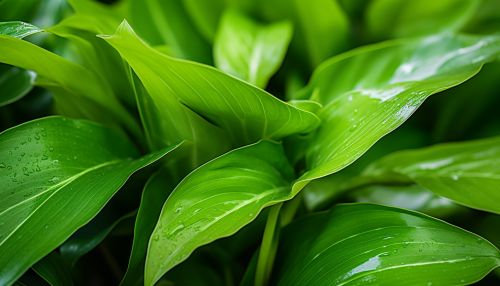The Role of Hormonal Signaling in Plant Defense Mechanisms
Introduction
Hormonal signaling plays a crucial role in the defense mechanisms of plants. It is a complex process that involves the production and transmission of chemical signals, known as hormones, which regulate the plant's response to various environmental stresses. This article delves into the intricate details of hormonal signaling in plant defense mechanisms, focusing on the types of hormones involved, their roles, and the mechanisms through which they operate.


Types of Hormones Involved in Plant Defense
There are several types of hormones involved in plant defense mechanisms. These include jasmonic acid (JA), salicylic acid (SA), ethylene, abscisic acid (ABA), and auxins.
Jasmonic Acid
Jasmonic acid is a plant hormone that plays a critical role in plant defense, particularly against herbivores and necrotrophic pathogens. It is involved in the regulation of plant responses to wounding, insect attack, and pathogen infection.
Salicylic Acid
Salicylic acid is another plant hormone that is crucial in plant defense. It is primarily involved in systemic acquired resistance (SAR), a type of plant immunity that provides long-lasting, broad-spectrum resistance to pathogens.
Ethylene
Ethylene is a gaseous plant hormone that plays a role in plant defense against pathogens. It is involved in the regulation of plant responses to stress, including pathogen attack.
Abscisic Acid
Abscisic acid is a plant hormone that plays a role in plant defense against abiotic stresses such as drought and salinity. It is also involved in the regulation of plant responses to pathogen attack.
Auxins
Auxins are a group of plant hormones that play a role in plant defense by regulating plant growth and development in response to environmental stresses.
Mechanisms of Hormonal Signaling in Plant Defense
Hormonal signaling in plant defense involves a series of complex processes, including hormone synthesis, signal perception, signal transduction, and response.
Hormone Synthesis
Hormone synthesis is the process by which plant hormones are produced. This process is triggered by various environmental stresses, such as pathogen attack, insect herbivory, or abiotic stresses like drought or salinity.
Signal Perception
Signal perception is the process by which plant cells recognize the presence of hormones. This is typically achieved through the binding of the hormone to a specific receptor protein, which triggers a series of downstream events.
Signal Transduction
Signal transduction is the process by which the signal from the hormone-receptor complex is transmitted to the interior of the cell. This process involves a series of biochemical reactions that amplify the signal and transmit it to the appropriate cellular machinery.
Response
The response is the final stage of hormonal signaling, where the plant cells respond to the hormone signal. This can involve a wide range of cellular processes, including changes in gene expression, protein synthesis, and metabolic activity.
Role of Hormonal Signaling in Plant Defense
Hormonal signaling plays a crucial role in plant defense by regulating the plant's response to various environmental stresses. The specific role of hormonal signaling in plant defense can vary depending on the type of hormone and the nature of the stress.
Role of Jasmonic Acid in Plant Defense
Jasmonic acid plays a critical role in plant defense against herbivores and necrotrophic pathogens. It is involved in the regulation of plant responses to wounding, insect attack, and pathogen infection.
Role of Salicylic Acid in Plant Defense
Salicylic acid plays a crucial role in plant defense against biotrophic and hemibiotrophic pathogens. It is primarily involved in systemic acquired resistance (SAR), a type of plant immunity that provides long-lasting, broad-spectrum resistance to pathogens.
Role of Ethylene in Plant Defense
Ethylene plays a role in plant defense against pathogens by regulating plant responses to stress, including pathogen attack. It is also involved in the regulation of plant growth and development in response to environmental stresses.
Role of Abscisic Acid in Plant Defense
Abscisic acid plays a role in plant defense against abiotic stresses such as drought and salinity. It is also involved in the regulation of plant responses to pathogen attack.
Role of Auxins in Plant Defense
Auxins play a role in plant defense by regulating plant growth and development in response to environmental stresses. They are also involved in the regulation of plant responses to pathogen attack.
Conclusion
In conclusion, hormonal signaling is a vital component of plant defense mechanisms. It involves a complex interplay of various hormones, each playing a unique role in regulating the plant's response to environmental stresses. Understanding the intricacies of hormonal signaling in plant defense can provide valuable insights into plant biology and can potentially lead to the development of more resilient crop varieties.
